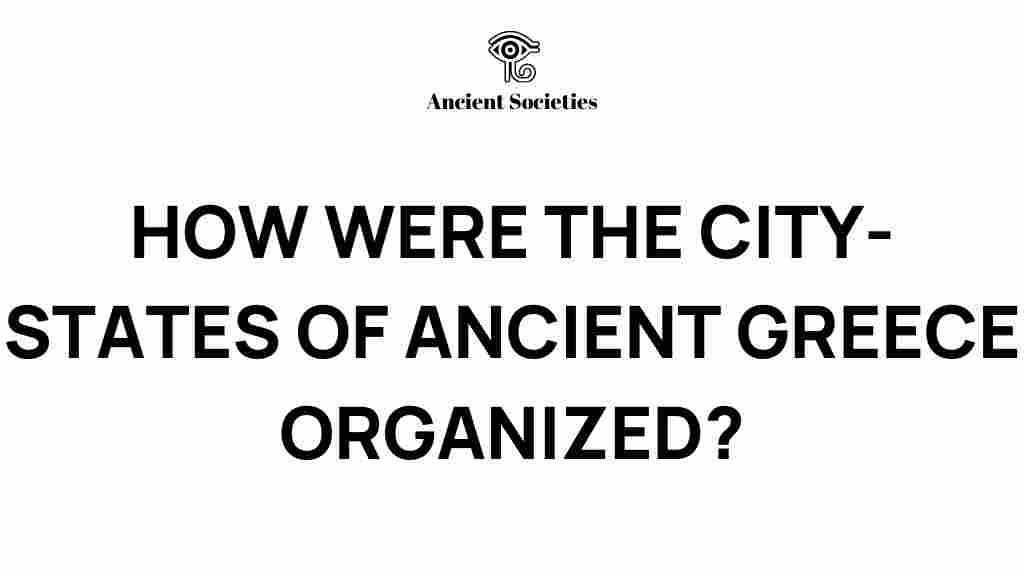Unraveling the Intricate Organization of Ancient Greece’s City-States
Ancient Greece, often hailed as the cradle of Western civilization, was characterized by its unique and intricate organization of city-states, known as polis. Each city-state functioned as an independent political entity, complete with its own governance, culture, and societal norms. This article explores the political structure, democracy, culture, history, governance, and regional power of Ancient Greece’s city-states, providing a comprehensive understanding of their significance in shaping modern political thought.
The Concept of City-States in Ancient Greece
The term city-states refers to the self-governing urban centers that dominated Ancient Greece, particularly during the Classical period (5th to 4th centuries BCE). Unlike modern nations, these city-states were often small, localized communities that encompassed a city and its surrounding territory. The most prominent city-states included:
- Athens: Renowned for its cultural and intellectual achievements.
- Sparta: Famous for its military prowess and austere lifestyle.
- Cornith: A major trade hub with a strategic location.
- Thebes: Known for its political and military strength.
Each of these city-states developed its own identity, governance, and way of life, contributing to the rich tapestry of Ancient Greece’s history.
The Political Structure of City-States
The political structure of city-states varied widely, but they generally shared some common features:
- Governance: City-states often had a form of governance that could be categorized as monarchy, oligarchy, tyranny, or democracy.
- Assemblies: Many city-states held assemblies where citizens could participate in decision-making.
- Councils: Councils composed of citizens, often chosen by lot, played a significant role in governance.
In Athens, a pioneering form of direct democracy emerged, allowing citizens to vote on laws and engage directly in political processes. This political structure laid the groundwork for modern democratic systems, emphasizing participation and civic responsibility.
Democracy in Ancient Greece
One of the most significant contributions of the city-states of Ancient Greece is the concept of democracy, particularly in Athens. Here are some key aspects of Athenian democracy:
- Direct Participation: Athenian citizens participated directly in decision-making, unlike representative democracies today.
- Citizenship: Citizenship was limited to free-born males, excluding women, slaves, and foreigners.
- Public Offices: Many public offices were filled by lot, minimizing the influence of wealth and status.
This system fostered a sense of community and accountability among citizens, although it also revealed the limitations and exclusivity of Athenian democracy.
Culture and Society within City-States
The cultural life of Ancient Greece’s city-states was vibrant and diverse, encompassing art, philosophy, and religion. Key cultural elements included:
- Art and Architecture: The Parthenon in Athens is a prime example of Classical architecture.
- Philosophy: Great thinkers like Socrates, Plato, and Aristotle emerged from these city-states, influencing Western thought.
- Theater: Dramatic festivals celebrated works by playwrights like Aeschylus, Sophocles, and Euripides.
Cultural achievements were often tied to the political structure and identity of each city-state, reflecting their values and beliefs.
Regional Power and Influence
The city-states of Ancient Greece were often in competition with one another, vying for regional power and influence. This rivalry led to:
- Alliances: City-states formed alliances, such as the Delian League led by Athens and the Peloponnesian League led by Sparta.
- Wars: Conflicts like the Peloponnesian War were fueled by competition for hegemony.
- Colonization: Many city-states established colonies across the Mediterranean, expanding their influence.
The interplay of cooperation and conflict among these city-states shaped the political landscape of Ancient Greece, influencing its history and legacy.
Challenges and Troubleshooting the Governance of City-States
Despite their advancements, city-states faced numerous challenges, including:
- Internal Strife: Factionalism and class conflicts often led to instability.
- External Threats: Persian invasions and later, Macedonian conquests posed significant threats.
- Economic Issues: Trade imbalances and resource scarcity could lead to tensions.
To address these challenges, many city-states employed various strategies:
- Diplomacy: Engaging in treaties and alliances to bolster security.
- Reforms: Leaders like Solon in Athens implemented reforms to alleviate social tensions.
- Military Organization: City-states like Sparta focused on military training and readiness to defend against external threats.
These responses to challenges highlight the dynamic nature of governance in Ancient Greece’s city-states.
Conclusion: The Legacy of Ancient Greek City-States
The city-states of Ancient Greece were not just political entities; they were vibrant centers of culture, thought, and innovation. Their unique governance structures, particularly the development of democracy in Athens, laid the foundations for modern political systems. The cultural achievements of these city-states continue to influence art, philosophy, and literature today.
As we study the intricate organization of these city-states, we gain insights into the complexities of human society and governance. Understanding their history enriches our appreciation of the democratic ideals that continue to shape our world. For further exploration of this topic, you can visit here for additional resources.
Ultimately, Ancient Greece’s city-states remind us of the enduring power of civic engagement, cultural expression, and the pursuit of knowledge. Their legacy remains a significant part of our historical narrative, inspiring future generations to build upon the foundations laid by their ancestors.
This article is in the category History and created by AncientSocieties Team
